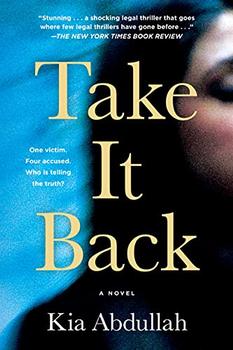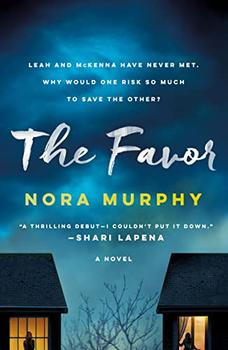Summary | Excerpt | Reviews | Beyond the book | Read-Alikes | Genres & Themes | Author Bio

In Kia Abdullah's novel Take It Back, sexual violence advisor Zara Kaleel becomes involved in a case where 16-year-old Jodie Wolfe is accusing four classmates of rape. Jodie has long been ostracized for having severe facial deformities resulting from a genetic condition, and she fears her claim will not be believed because, in her opinion, most people think no one would want to be intimate with someone so "ugly." Complicating the situation is the fact that the accused are socially popular and, at least superficially, well-behaved young men who are trusted by their community; they also happen to be Muslim. Zara, who is herself from a traditional Muslim family, agrees to help Jodie, which leads to a fascinating courtroom drama that forces Zara to re-evaluate the trajectory of her life and to acknowledge how her own background has influenced her decisions.
The book checks all the thematic boxes one would expect to encounter in a novel with the above setup. Abdullah illustrates how much a perceived difference in a person's appearance can impact others' perception of them, whether that difference is the color of their skin or a disfigurement. She also highlights the hostility held by some citizens of Western countries toward those from a Muslim background, and the distrust of white individuals that some Muslims develop as a result. Beyond that, the author uses Zara to illustrate the challenges modern Muslim women may face when trying to balance the demands of a career with the traditional expectations of their families.
The trial at the center of the novel is exceptionally well-written, quite captivating and the book's highlight. Abdullah skillfully shifts perspective on who is the guilty party; one minute we believe Jodie, the next, her supposed attackers. We aren't sure of the truth until the last page, and the tension the author creates keeps the narrative moving quickly.
Less convincing are the sections that concern Zara's personal struggles. She's portrayed as trying to distract herself with men and drugs, but it's never really clear how or why she developed these habits. Over the course of the novel, she shows growth, but while she commits minor errors that help her realize she may have a problem, there's no real crisis that forces change. She exhibits a great deal of rancor toward her family members, but there's not enough information about how tensions rose so high, and the conversations between her and her brother, the head of the family, border on cartoonish.
I also felt some of the scenes focusing on the boys were contrived. There are discussions between them from which it's clear something happened, but the manner in which these scenes are written makes them lack believability; in many cases they come across not so much as realistic dialogues between teenage boys as they do inelegantly inserted teasers.
Given the serious subject matter, I wouldn't necessarily call Take It Back a light read, but it's definitely an engrossing one in spite of its flaws. It holds up as a courtroom drama and will keep most readers engaged from start to finish. It's recommended for those looking for a bit of escapism, and particularly those who enjoy fast-paced books involving jury trials.
![]() This review was originally published in The BookBrowse Review in January 2021, and has been updated for the
February 2022 edition.
Click here to go to this issue.
This review was originally published in The BookBrowse Review in January 2021, and has been updated for the
February 2022 edition.
Click here to go to this issue.

If you liked Take It Back, try these:

by Jessica Knoll
Published 2024
From the megabestselling author of Luckiest Girl Alive comes another shocking thriller inspired by the real-life sorority and target of America's first celebrity serial killer.

by Nora Murphy
Published 2023
A gripping debut domestic suspense novel, Nora Murphy's thrilling The Favor explores with compassion and depth what can happen when women pushed to the limit take matters into their own hands.
Your guide toexceptional books
BookBrowse seeks out and recommends the best in contemporary fiction and nonfiction—books that not only engage and entertain but also deepen our understanding of ourselves and the world around us.